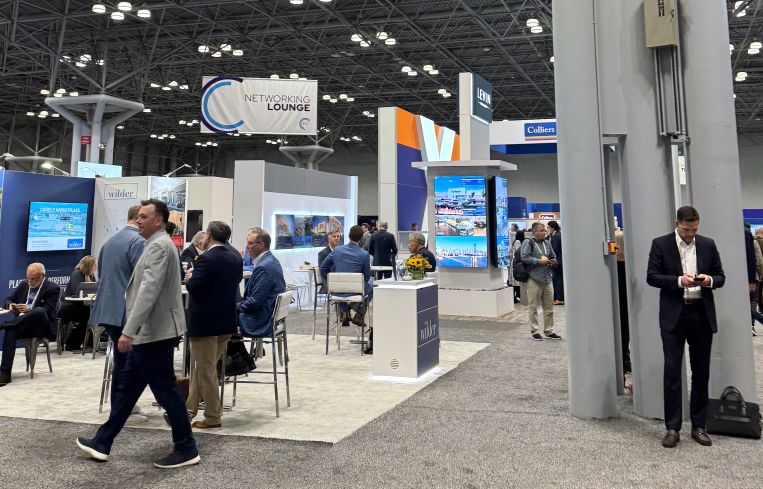Despite Retail Bankruptcies, ICSC NY Attendees Have High Spirits
By Isabelle Durso and Mark Hallum December 12, 2024 3:54 pm
reprints
The biggest names in the retail industry came together at ICSC New York this week, with relatively high spirits and persistent dealmaking (despite bankruptcies and store closings piling up).
The annual convention at Manhattan’s Jacob K. Javits Convention Center came at an exciting time for the city’s retail sector, which has been “getting a lot more attention” this year compared to other asset classes, Ariel Schuster, vice chairman of leasing at Newmark, told Commercial Observer.
“Each asset class has their own timing,” Schuster said. “Office is going through a patch. Retail is having a moment right now.
Attendees started off bright and early Wednesday with a jam-packed schedule of sessions, panels and hundreds of booths for the city’s biggest brokerages and national retailers.
Panels on topics ranging from Starbucks’ expansion and redesign plans for 2025 to Vantage Group and the Port Authority of New York and New Jersey’s development of Terminal 6 at John F. Kennedy International Airport gave attendees a variety of retail topics and opportunities to discuss.
Schuster added that “the beautiful thing with ICSC season” is that, with hundreds of retailers in the city for the convention, more and more tours and deals are happening this week. This was particularly true in attractive neighborhoods like Brooklyn’s Williamsburg and Manhattan’s SoHo, where retail investment sales are booming.
“New York City has been on a pretty strong upswing,” Brandon Singer, CEO and founder of Retail by MONA, told CO. “The food and beverage concepts, the digitally native brands are expanding. SoHo is on fire. Williamsburg is on fire.”
Major recent retail deals like Empire State Realty Trust’s $195 million acquisition of prime retail space along Williamsburg’s North Sixth Street seemed to fuel hope at ICSC, where attendees looked energized and eager to talk business.
But the future still holds uncertainties for retail, including a lack of good supply for expansions. While there are plenty of vacant strip malls in the U.S., tenants aren’t just banking on any old box: Like office occupants, they’re choosing only the best.
“Look, we can always find a crummy shopping center in a suburb that’s going to be 30 percent [vacant, but] your top-level properties, they’re all at less than 5 percent vacant,” Naveen Jaggi, president of retail advisory services for JLL, told CO. “You better be able to take the rent they’re quoting as opposed to expecting some kind of 10 or 20 percent discount.
“Landlords aren’t budging,” Jaggi added. “They know they’ve got the leverage right now without a new population of development coming, and so they’re going to leverage it.”
Drugstores around the country have also been feeling some pain — with pharmacy chains closing stores and some filing for bankruptcy — thanks to a combination of organized retail theft, high-wage staff needed to dole out medications and the cost of keeping shelves stocked.
“It’s not been a sales issue. You can look at any pharmacy location, the sales are incredibly strong,” Meghann Martindale, director of market intelligence for retail at Avison Young, said during a Thursday panel. “But that store may not be profitable simply because of the pharmacy side, and this is something that is not specific to CVS, Rite Aid or Walgreens. It’s everybody, and I think we’re still trying to figure out what that new model looks like with issues that we don’t typically have to address in real estate.”
For landlords, things on the development side will continue to be stalled as labor costs, inflation and interest rates remain high, according to JLL’s Jaggi.
“Retailers and developers need to find a new pro forma model that takes into account all the new costs that won’t be coming down,” he said. “The problem that creates is a potential inflationary impact to what you’re selling. Because if you don’t raise prices, then where are you going to make that deal work?”
Jaggi said retailers will have to deal with higher costs by doing something they don’t want to do: pass it on to the consumer.
With a business-friendly administration returning to the White House with Donald Trump, there may be some additional underwriting and permitting for development in 2025. But even then, the supply won’t loosen up until those developments are delivered in the following years, according to Jaggi.
Despite the slowdown in development and a pileup of retail closings, the general sentiment at ICSC this year was simple: The industry just has to push through.
“I think as time goes on, and the economy keeps going and getting better and improving — some of that’s just fallout from the pandemic and all the craziness that we had — there’s always going to be bankruptcies,” Singer said. “Just gotta keep going.”
Isabelle Durso can be reached at idurso@commercialobserver.com. Mark Hallum can be reached at mhallum@commercialobserver.com.



